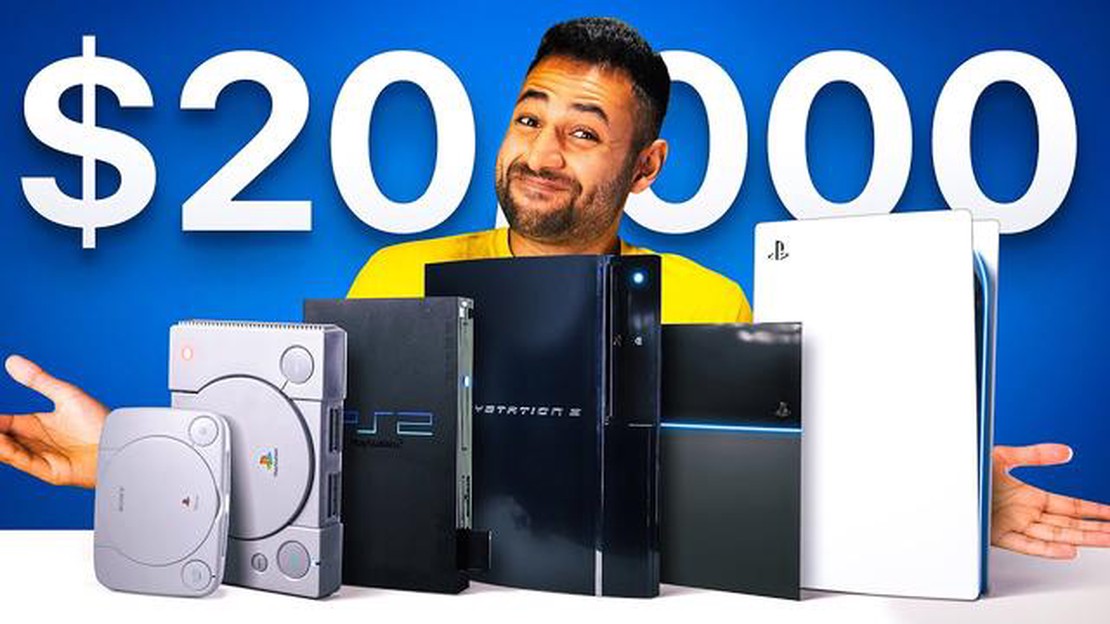How to properly report someone in Discord: the official way
How to officially report someone in discord. Discord is one of the most popular platforms for communicating and playing with friends. However, as with …
Read Article
Japanese company Sony continues to conquer the gaming industry, and they have recently been granted patent rights to all 5 generations of Sony PlayStation consoles. This is a major accomplishment for a company that has been the leading gaming brand in the world for decades.
Sony started their journey in the gaming industry with the release of the original PlayStation in 1994. Since then, Sony has released 4 more generations of consoles - PlayStation 2, PlayStation 3, PlayStation 4 and PlayStation 5. Each new console offered players increasingly advanced technology and new features.
Over the years, Sony has built a huge and loyal audience that looks forward to each new generation of PlayStation consoles. Each PlayStation console gets better and more powerful, bringing new levels of graphics, sound and features to the world of gaming.
Sony’s patent rights for 5 generations of PlayStation consoles are a testament to the reliability and quality of the products. This is further proof that Sony PlayStation remains one of the most successful brands in the gaming industry, and the company continues to surprise and delight its fans around the world.
Game console manufacturer Sony PlayStation has been granted patents for its five generations of units in Japan. This means that Sony is officially recognized as the owner of the intellectual rights to the design and specifications of all generations of PlayStation released by the company.
The first PlayStation was released in 1994 and became a popular gaming platform competing with Nintendo and Sega. Each subsequent generation of PlayStation had progressive changes in design and features. The PlayStation 2, which was released in 2000, became the best-selling console of all time with over 155 million units sold.
The PlayStation 3, released in 2006, was the first console from Sony with high-definition support and Blu-ray disc playback. The PlayStation 4, released in 2013, was the most powerful and popular console at the time of its release, selling over 100 million copies worldwide.
Finally, PlayStation 5, the latest generation of PlayStation, was released in 2020 and represents new standards in graphics and processing. It features improved performance, ray tracing support, and faster boot times through the use of solid state storage.
Read Also: Top 5 SNES Emulators For Android in 2023 - Play Your Favorite Old-School Games on the Go!
Obtaining patents for all generations of PlayStation in Japan is an important step for Sony. They have now protected their rights and will avoid potential disputes with other companies using PlayStation design or technology without Sony’s permission. This also confirms PlayStation’s significant influence and success in the gaming industry.
Overall, the patents that Sony has obtained emphasize the significance of each generation of PlayStation and its contribution to the gaming industry. The longevity and constant evolution of the platform allows gamers to enjoy games and create amazing experiences for years to come.
5 generations of Sony PlayStation consoles have been patented in Japan. This will be interesting for all video game and technology lovers. The news of the patented generations of PlayStation has sparked a lively discussion among gamers and the industry as a whole.
For those unfamiliar with the PlayStation, here’s a little overview of each generation:
Read Also: How To Take A Screenshot on Samsung Galaxy S21 (2 Easy Ways)
Each generation of PlayStation has its own unique features and advancements. The gaming industry is constantly evolving and new consoles from Sony bring new technologies and features for players.
The patented PlayStation generations confirm Sony’s constant work to improve the gaming industry and develop new technologies. This is good news for gamers and everyone is waiting for the official announcement of new consoles from Sony.
All five generations of Sony PlayStation consoles have been patented in Japan.
The first generations of Sony PlayStation consoles were patented in 1994 and 2000.
A patent application for a Sony PlayStation console in Japan can be filed by any person or organization that is the creator of the technology or has the rights to use it.
The best-selling Sony PlayStation console in Japan was the PlayStation 2.
A patent for a Sony PlayStation console in Japan is an official document that confirms the owner’s rights to use and protect the technology from unauthorized use by other individuals or organizations.
How to officially report someone in discord. Discord is one of the most popular platforms for communicating and playing with friends. However, as with …
Read ArticleHow To Fix COD Warzone 2.0 Social Not Working Error (Updated 2023) If you’re an avid gamer who enjoys playing Call of Duty Warzone 2.0, you might have …
Read ArticleIs the future in “google stadiums”? Online gaming has always been and continues to be an important part of the entertainment industry. As technology …
Read ArticleHow to fix Huawei P30 Youtube keeps crashing | Youtube not working on Huawei If you own a Huawei P30 and you’re experiencing issues with YouTube …
Read ArticleHow To Play Steam Games Offline/No Internet | Offline Mode | NEW in 2023! If you’re a gaming enthusiast, chances are you’ve heard of Steam, the …
Read Article5 Gifts For The Woman Who Wants Nothing When it comes to gifting, it can be a daunting task to find something truly unique for the woman who seems to …
Read Article